#also the video was. ok
Text






anthony is dead: the funeral roast (paid content)
#daniel howell#amazingphil#dan and phil#phan#smosh#anthony padilla#mine#my content#hi sorry i can't get a hold of the person who shared this clip with me so i don't feel comfortable posting it in full#however i'm not a good enough person to Not Gif It#so here u go here's a bit of it in gif form lol#i'm going to sleep i'm sure by the time i wake up the full video will be up#oh also oh my god this clip gives me such super amazing project vibes i almost cried#ok. anyway. it's 8:20am. im drunk still. goodnight im finally going to bed x
6K notes
·
View notes
Text






"Maybe we can try again in another 100 years."
#disneyedit#once upon a studio#ok this is the second disney clip or video i've DL'd this year to gif#where the color in the gif editor is duller than the actual .mkv file#maybe it's an mkv thing or#maybe Disney has encoding to make it look washed out these days to prevent theft#anyway these are my faves#1 - favorite disney character (Vanellope)#2 - Favorite short (the Frozen Winter short)#3 - Favorite Disney movie (Tarzan)#4 - favorite Villain (bc Maleficent is not here?)#5 Favorite Other Girl (Dolores)#I guess 5 is also favorite other voice acting (Jaeger Clade)#6 - Baymax
3K notes
·
View notes
Text
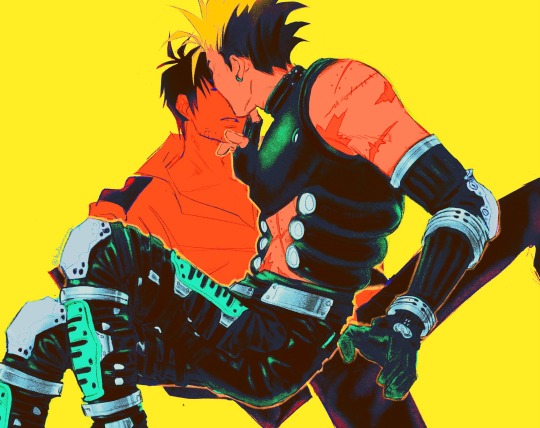
intensity
(larger version under the cut!)
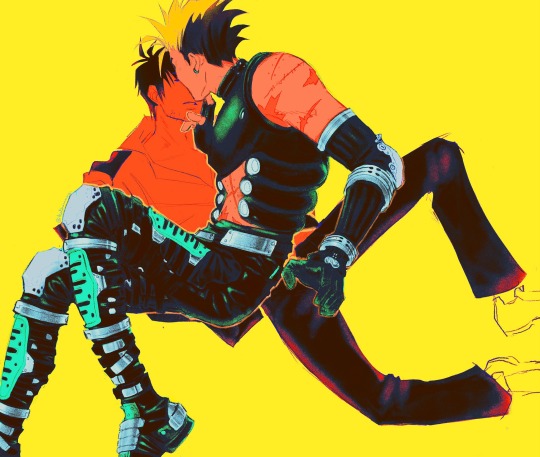
#i swear i didn’t die#video games are taking over my life oops#next au comic is on it’s way though! just gotta line it and stuff#but goddamn#vashwood and their horrific levels of tension have captured my brain yet again#look at them go#drawing vash’s undersuit ended my life seven times over please appreciate it 🙏🏽#it’s hot as hell but it’s also! the bane of my existence#vash#vash the stampede#wolfwood#nicholas d. wolfwood#vash x wolfwood#vashwood#trigun#trigun maximum#ok bye
4K notes
·
View notes
Text
None Of You Know What Haiku Are
I'm going to preface this by saying that i am not an expert in ANY form of poetry, just an enthusiast. Also, this post is... really long. Too long? Definitely too long. Whoops! I love poetry.
If you ask most English-speaking people (or haiku-bot) what a haiku is, they would probably say that it's a form of poetry that has 3 lines, with 5, and then 7, and then 5 syllables in them. That's certainly what I was taught in school when we did our scant poetry unit, but since... idk elementary school when I learned that, I've learned that that's actually a pretty inaccurate definition of haiku. And I think that inaccurate definition is a big part of why most people (myself included until relatively recently!) think that haiku are kind of... dumb? unimpressive? simple and boring? I mean, if you can just put any words with the right number of syllables into 3 lines, what makes it special?
Well, let me get into why the 5-7-5 understanding of haiku is wrong, and also what makes haiku so special (with examples)!
First of all, Japanese doesn't have syllables! There's a few different names for what phonetic units actually make up the language- In Japanese, they're called "On" (音), which translates to "sound", although English-language linguists often call it a "mora" (μ), which (quoting from Wikipedia here) "is a basic timing unit in the phonology of some spoken languages, equal to or shorter than a syllable." (x) "Oh" is one syllable, and also one mora, whereas "Oi" has one syllable, but two moras. "Ba" has one mora, "Baa" has two moras, etc. In English, we would say that a haiku is made up of three lines, with 5-7-5 syllables in them, 17 syllables total. In Japanese, that would be 17 sounds.
For an example of the difference, the word "haiku", in English, has 2 syllables (hai-ku), but in Japanese, はいく has 3 sounds (ha-i-ku). "Christmas" has 2 syllables, but in Japanese, "クリスマス" (ku-ri-su-ma-su) is 5 sounds! that's a while line on its own! Sometimes the syllables are the same as the sounds ("sushi" is two syllables, and すし is two sounds), but sometimes they're very different.
In addition, words in Japanese are frequently longer than their English equivalents. For example, the word "cuckoo" in Japanese is "ほととぎす" (hototogisu).
Now, I'm sure you're all very impressed at how I can use an English to Japanese dictionary (thank you, my mother is proud), but what does any of this matter? So two languages are different. How does that impact our understanding of haiku?
Well, if you think about the fact that Japanese words are frequently longer than English words, AND that Japanese counts sounds and not syllables, you can see how, "based purely on a 17-syllable counting method, a poet writing in English could easily slip in enough words for two haiku in Japanese” (quote from Grit, Grace, and Gold: Haiku Celebrating the Sports of Summer by Kit Pancoast Nagamura). If you're writing a poem using 17 English syllables, you are writing significantly more content than is in an authentic Japanese haiku.
(Also not all Japanese haiku are 17 sounds at all. It's really more of a guideline.)
Focusing on the 5-7-5 form leads to ignoring other strategies/common conventions of haiku, which personally, I think are more interesting! Two of the big ones are kigo, a season word, and kireji, a cutting word.
Kigo are words/phrases/images associated with a particular season, like snow for winter, or cherry blossoms for spring. In Japan, they actually publish reference books of kigo called saijiki, which is basically like a dictionary or almanac of kigo, describing the meaning, providing a list of related words, and some haiku that use that kigo. Using a a particular kigo both grounds the haiku in a particular time, but also alludes to other haiku that have used the same one.
Kireji is a thing that doesn't easily translate to English, but it's almost like a spoken piece of punctuation, separating the haiku into two parts/images that resonate with and add depth to each other. Some examples of kireji would be "ya", "keri", and "kana." Here's kireji in action in one of the most famous haiku:
古池や 蛙飛び込む 水の音
(Furu ike ya kawazu tobikomu mizu no oto)
(The old pond —
A frog jumps in
The sound of the water.)
You can see the kireji at the end of the first line- 古池や literally translates to "old pond ya". The "ya" doesn't have linguistic meaning, but it denotes the separation between the two focuses of the haiku. First, we are picturing a pond. It's old, mature. The water is still. And then there's a frog! It's spring and he's fresh and new to the world! He jumps into the pond and goes "splash"! Wowie! When I say "cutting word", instead of say, a knife cutting, I like to imagine a film cut. The camera shows the pond, and then it cuts to the frog who jumps in.
English doesn't really have a version of this, at least not one that's spoken, but in English language haiku, people will frequently use a dash or an ellipses to fill the same role.
Format aside, there are also some conventions of the actual content, too. They frequently focus on nature, and are generally use direct language without metaphor. They use concrete images without judgement or analysis, inviting the reader to step into their shoes and imagine how they'd feel in the situation. It's not about describing how you feel, so much as it's about describing what made you feel.
Now, let's put it all together, looking at a haiku written Yosa Buson around 1760 (translated by Harold G. Henderson)
The piercing chill I feel:
my dead wife's comb, in our bedroom,
under my heel
We've got our kigo with "the piercing chill." We read that, and we imagine it's probably winter. It's cold, and the kind of cold wind that cuts through you. There's our kireji- this translation uses a colon to differentiate our two images: the piercing chill, and the poet stepping on his dead wife's comb. There's no descriptions of what the poet is feeling, but you can imagine stepping into his shoes. You can imagine the pain he's experiencing in that moment on your own.
"But tumblr user corvidcall!" I hear you say, "All the examples you've used so far are Japanese haiku that have been translated! Are you implying that it's impossible for a good haiku to be written in English?" NO!!!!! I love English haiku! Here's a good example, which won first place in the 2000 Henderson haiku contest, sponsored by the Haiku Society of America:
meteor shower . . .
a gentle wave
wets our sandals
When you read this one, can you imagine being in the poet's place? Do you feel the surprise as the tide comes in? Do you feel the summer-ness of the moment? Haiku are about describing things with the senses, and how you take in the world around you. In a way, it's like the poet is only setting a scene, which you inhabit and fill with meaning based on your own experiences. You and I are imagining different beaches, different waves, different people that make up the "our" it mentioned.
"Do I HAVE to include all these things when I write haiku? If I include all these things, does that mean my haiku will be good?" I mean, I don't know. What colors make up a good painting? What scenes make up a good play? It's a creative medium, and nobody can really tell you you can't experiment with form. Certainly not me! But I think it's important to know what the conventions of the form are, so you can appreciate good examples of it, and so you can know what you're actually experimenting with. And I mean... I'm not the poetry cops. But if you're not interested in engaging with the actual conventions and limitations of the form, then why are you even using that form?
I'll leave you with one more English language haiku, which is probably my favorite haiku ever. It was written by Tom Bierovic, and won first place at the 2021 Haiku Society of America Haiku Awards
a year at most . . .
we pretend to watch
the hummingbirds
Sources: (x) (x) (x) (x) (x) (x)
Further reading:
Forms in English Haiku by Keiko Imaoka
Haiku: A Whole Lot More Than 5-7-5 by Jack
How to Write a Bad Haiku by KrisL
Haiku Are Not a Joke: A Plea from a Poet Who Has Had It Up to Here by Sandra Simpson
Haiku Checklist by Katherine Raine
#poetry#haiku#writing#literature#anime life#long post#i want to apologize but i had to get something off my chest#and the thing was. i love haiku#and when i see posts on here about haiku. i get so angy.#well ok i really get more disappointed bc nobody is really engaging with the form on its own terms#anyway i hope you enjoy some of my favorite haiku because theyre in there!!!!!#i didnt really get into the history of haiku. and i also did not get into why i got really into it#but i will say that i was really inspired by Jacob Geller's video A Thousand Ways of Seeing a Forest#which is a lot about translation#(which i mean. as an interpreter AND a poetry-enjoyer. really appealed to me lol)
10K notes
·
View notes
Text
tracked down this clip just because of this post! have jokes from skizz and scar
#i spent way longer than id like to admit doing these captions. autocaptions was completely busted so i did em manually#please let me know if i missed / should change anything!#i am a person who needs captions trying to make captions for others lmfao. are the colors ok? too subtle? i wanted them legible still but#anyways sdkjhg here have this#txtly described#(bc i made the captions)#though i will probably also add a video descrip later just. not rn sorry guys#also blease if you can find the post LINK ME i have been searching the tag for ages#hermitcraft#skizzleman#goodtimeswithscar#grian#edit: thank you to the person who linked the post!! :D#second edit: yall ive been trying to swap the video out for the corrected one and it wont swap help
801 notes
·
View notes
Text
They could film GO S3 in Neil Gaiman's backyard with our two guys and cardboard props and I'd still watch TF out of it.
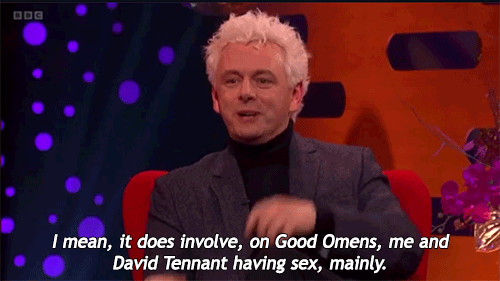
Filming backyard episode six might need a tall fence, though 👀
#angel and demon home videos#not that kind#ok maybe ALSO that kind#and now the rest of the story#good omens#good omens 3#ineffable husbands
935 notes
·
View notes
Text
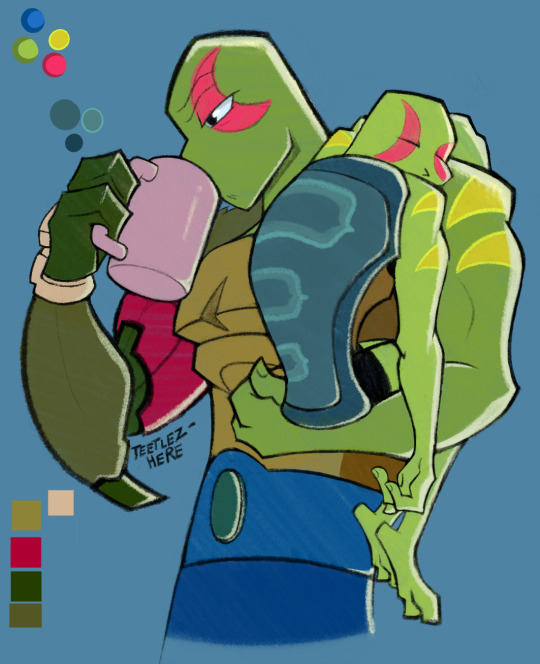
There is some angst going on irl and I craved fluff/comfort.
So morning/wake up time with Future Leo and Present Leo. Future Leo gets some needed coffee and mini Leo is still eepy but he gotta wake up.
Mini Leo be collecting parental figures like collectibles in a videogame fr.
#Rise fandom forgive me for I have not finished my Movie anniversary tribute pics and videos as I thought I would.#Please accept this humble soft Leos moment#rottmnt#tmnt#rise of the tmnt#riseofthetmnt#rottmnt Leo#future Leo#future leonardo#future!leo#f!leo#rottmnt au#ok apocalennials#I’m all for future Leo will punch his younger self in the face#but he will be dad/big bro to his younger self and the present turtles#brain: stop drawing f!leo dad™️ mini leo! he’s CJ’s dad!#also my brain: fluff time go brrrrr#tcest dni#I will end your Wi-Fi forever#and steal your kneecaps#au related pic that I am working on but I’m slower than slow motion jutsu#my friend is dragging me to a weekend between us and told me no drawing tablet. RIP#BUT I STREAMED THE MOVIE#OVER 10 TIMES in the last few days!#also nimona btw so Netflix won’t think I’m a bot
2K notes
·
View notes
Text

sakura: pick, a kiss from me or from her?
naruto, whispering: …a kiss from sasuke
sakura: 🫢
ino: 🤣
sasuke: ❔
#sasunaru#narusasu#naruto#sasuke#sakura#ino#round fox baby#naruto’s boyfriend#I THINK IM FUNNY OK AKHHDJHH DD#i spent WAAAAAAAYYY too much time coloring this#for it to flop so#pls dont make it flop#jk idec i KNOW IM FUNNY#my art#my comic#ALSO THIS IS LIKE#FROM A VIDEO OF A FILIPINO BLOGGER#im sure my filipino ppl know this ehehehehe#buT YEAH SO THE AXTUAL REPLY OF THE STUDENT WAS LIKE#A KISS FROM A HANDSOME GUY#LMAOOOOOO IT WAS SO FUNNY BC LIKE#SHES SO -RETTY AND STUFF#AND HE REPLIES THAT AHAHAHKUJHDBKJHFF#UNDERSTSMDABLE KUYA#but yeah wow congratulate me on clenching my teeth and using]#layer mode bc im just dumb and wont use em
987 notes
·
View notes
Text
BETTER CALL SAUL!
#this was mostly a test run on procreate dream!#its pretty good but it has a LOT of room for improvement#which i know the developers have been working on since the app is still technically in beta!#but hey i did this in like 3 weeks while working a full time job and also working on other art so#its pretty damn powerful software#good shit if you use procreate already!!#literally the biggest flaws rn are a lack of selection tool an undo/redo button and#and the app itself has a tendency to crash or slow down if theres “too much” going on#like i had to delete all but one of the preloaded animations just so the app would run smoother while i worked#so its still very clearly in its early phase but its good and im excited to see what the developers will do with it#ok review over#better call saul#saul goodman#bcs#jimmy mcgill#breaking bad#animation#brba#video#procreate dreams
587 notes
·
View notes
Text
jelly covering misto's eyes during the rum tum tugger + misto dodging her hand
(source)
#cats the musical#mistoffelees#jellylorum#tuggoffelees#this counts as tuggoffelees right. well it does to me#song: rtt#video#my post#havent seen anyone post this clip yet so#ok im like. 90% sure this is#rccl cast 14#jackey good#daniel chesnut#i THINK... i hope#EDIT: AND#jarrad biron green#is for sure tugger (he posted this jfkskfks)#also at the beginning jelly waved at misto to follow her to the trunk#ssoo cute theyre so auntie and nephew
259 notes
·
View notes
Text
at a certain point i think we need to acknowledge that art is very rarely created accidentally. if you can see a theme in a work than that theme was, more likely than not, at least somewhat intentional on behalf of the creator. you don't put a piece of yourself out into the world without thinking about what it means at least a little bit.
#sigh. sorry got a comment like 'nintendo creates these accidentally heartbreaking scenarios and then fans add depth' and i just.#do you really think that not a single professional adult writer on the oot writing team thought about the implications of the scenario they#were writing. do you think that all of the ways in which the world is set up to reinforce the themes brought up by that scenario are also#accidental. do you think writing is just throwing shit at a wall and seeing what sticks without any more complex thought.#do you truly genuinely think that in a game so constrained by storage & software limitations ANYTHING about that story would be accidental#it just seems like such a sad and reductive way to view art. it's like you can't imagine that anything is done in earnest.#that people might really care about the things they create. that they might be truly meaningful.#the mcuification of story analysis. we just assume that nothing has substance anymore ig. our brains are so flooded with consumerist#garbage that we assume all art is made purely for consumption and profit. ok#WHATEVER. sorry. i have this disease where im obsessed with video games as art and i hate that no one sees it like i do#personal
351 notes
·
View notes
Text


bilingual struggles
(sorry this is super long)
#sk8 the infinity#art tag#long post#langa's doing his best his brain cells are working as hard as they can#this happens to me all the time#worst is when you forget one word in 2/3 languages#but you forget another word in a different 2/3 languages#i hope the image isnt blurry#they are HUGE sizes tho#in the preview they're super blurry#tumblr why#actually i also have a video version i used for the bird site#bc it's so picky about image dimensions yanno#here i can just shove in the longest post and tumblr will be like yes ok sir this is a struggle but we'll do it for you
808 notes
·
View notes
Text
it's all about the noises
bonus frames from the vid!



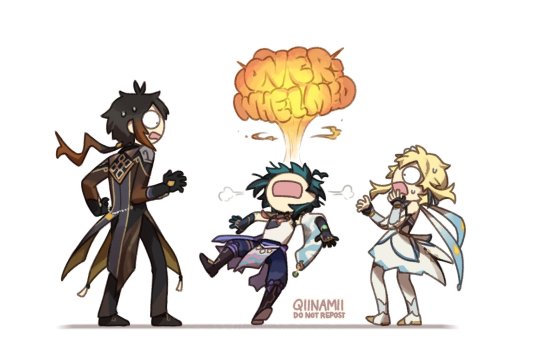
#qiiarts#animation#qiianimates#yo tf is that tag ok anyway#i've enjoyed making this at the high of the hype because xiao noises fuel my core#i set him at jp for years and waiting for two is worth the low guttural “naze omae ma de” cold anger to us he can slice me in half anytime#but he's also very skrungly! and will die immediately in a family dinner gathering#took me 3 days and my entire wrist i will do it again next time#xiao#lumine#traveler#paimon#zhongli#venti#some parts are. definitely missing but hey i already fixed it.......... not in the video <33333#genshin impact#forgot the gnsn tag pls dont maim me
724 notes
·
View notes
Text
They are both boy fails and I love them.
#se nota que soy chileno o no#los amo a los dos u_u#usagi yuichi#yuichi usagi#samurai rabbit#srtuc#samurai rabbit the usagi chronicles#miyamoto usagi#I'M TAGGING THEM BOTH BCS THEY ARE BOTH IN THE VIDEO OK?#also is a really great joke#(lies)#anyways dO YOU SEE MY VISION?
396 notes
·
View notes
Text

to me this line is like, where harry reaches the closest thing to self actualization within the text of the game. he doesn't desire to be a different kind of animal anymore. its such a kind thing to say to himself about a quality that in his line of work could very much be perceived as a flaw. idk i just like it
#im probably gonna put something close to this in my video but i just. yeah#disco elysium spoilers#ANNIE AND FEARGHUS DON'T READ#but like the way the phasmid goes on to say that it empathizes with harry/humanity itself due to its sensitivity#to have that experience which is so accepted and brushed off in day to day life be heard and sympathized with#something something the way disco elysium presents humanity's unique consciousness as something that is often overwhelmig and horrifying#and forgives harry for being overwhelmed by that sensitivity and consciousness and congratulating him for even reaching this point#IDFKKKKK#the noid line thats like consciousness is new to the universe we all have our ways to ease the shock#literally been thinking about it for WEEKS#the way we interface with the world is unique and beautiful but it can also be terrifying and devastating so its ok to be scared#even if it feels like everyone else is fine#getting personal in the tumblr tags ummm#disco elysium#disco elysium meta#harry du bois#insulindian phasmid
317 notes
·
View notes
Text


realized i can finally draw Ghosts Blackcell skin ever since my gold and black aesthetic lovin ass saw it 💛😞
#me: omg that looks so fukkin silly piss boy *obsesses over it for the next month n a half*#ghost#i fell for the bait😔#ft. my fav Loud Ass Gun aka Bing Boomi#i just rlly wanted to paint his gold skull ok#also yes i cracked and finally made a bullet brush ive hAD ITTT#ghost call of duty#my art#fanart#call of duty modern warfare 2#call of duty#call of duty modern warfare#cod#ghost mw2#ghost cod#simon ghost riley#simon riley#video game#gold#gold aesthetic#gun#gun tw#tw gun
844 notes
·
View notes